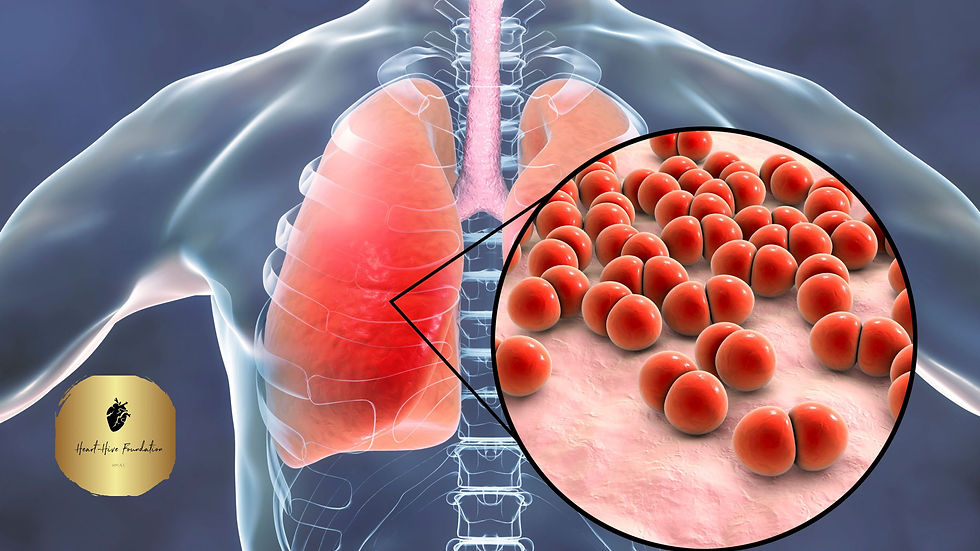The Silent Crisis: Right to Healthcare and Preventable Child Deaths in Africa
- hearthiveorg

- Mar 25, 2025
- 4 min read
Updated: Jul 30, 2025
In many parts of the world, preventable diseases have been largely eliminated or controlled thanks to vaccines, better healthcare systems, and improved living standards that support the right to healthcare. However, in Africa, these diseases continue to claim the lives of countless children each year.
This devastating reality is often overlooked or underreported, yet it remains a critical issue that needs immediate attention. This article explores why preventable diseases are still taking the lives of African children and what can be done to address this silent crisis.
The Right to Healthcare: A Critical Foundation

Every child deserves access to essential healthcare services. Unfortunately, many African children are denied this basic right, which contributes significantly to the ongoing crisis of preventable diseases on the continent. It is crucial that we all find ways to help a child receive the care they need to survive and thrive.
Understanding Preventable Diseases: What Are They?
Preventable diseases are illnesses that can be avoided through vaccination, proper nutrition, improved sanitation, and access to healthcare. These diseases range from simple infections like diarrhea to more severe conditions like pneumonia, malaria, and measles.
Despite the availability of vaccines, treatments, and preventive measures, many poor kids in Africa continue to die from these diseases due in large part to the lack of fulfillment of their right to healthcare.
Vaccination and the Right to Healthcare

One of the most effective ways to prevent childhood diseases is through vaccination. Vaccines protect children from diseases like measles, polio, diphtheria, and tetanus. In the early 20th century, these diseases caused widespread deaths around the globe. However, thanks to vaccination campaigns, many countries have seen a significant decline in these illnesses.
In Africa, access to vaccines remains a significant challenge. While many urban areas have good vaccination coverage, rural regions often lack the infrastructure needed for effective distribution. Health workers in remote villages face difficulties reaching children with life-saving immunizations due to poor roads, lack of transportation, and limited healthcare facilities. This situation violates the essential right to healthcare, leaving many children vulnerable to diseases that could have been easily prevented.
Malaria and Healthcare Access

Malaria is one of the most well-known preventable diseases continuing to devastate African children. According to the World Health Organization (WHO), Africa accounts for over 90% of global malaria cases and deaths.
Despite the availability of effective treatments and preventive measures such as insecticide-treated bed nets, malaria continues to kill thousands of children each year. One major reason is the lack of timely access to healthcare, especially in rural areas. Children suffering from malaria often do not receive prompt treatment, increasing their risk of severe complications and death. Upholding the right to healthcare is critical to changing this reality.
Pneumonia and the Importance of Medical Care

Pneumonia is another leading cause of death among African children, caused by bacterial or viral infections affecting the lungs. In developed countries, pneumonia is manageable due to access to antibiotics and healthcare services. Unfortunately, poor kids in Africa still die from pneumonia because they lack access to these essential medical treatments.
This highlights the critical importance of guaranteeing children access to healthcare services to reduce mortality rates from such preventable illnesses.
Diarrheal Diseases: Sanitation and Health Education
Diarrheal diseases are a leading cause of child death in Africa, often caused by contaminated water and poor sanitation. Treatment is available and effective, but millions still die due to inadequate access to healthcare and sanitation.
The root causes include poverty, unsafe drinking water, and lack of hygiene practices, combined with insufficient health education in communities. Ensuring access to healthcare facilities and community education is vital to tackling this issue and upholding the right to healthcare for all children.
Malnutrition: A Healthcare and Nutrition Challenge
Malnutrition weakens children’s immune systems, making them more vulnerable to infections like malaria, pneumonia, and diarrhea. Causes include food insecurity and poor feeding practices.
Addressing malnutrition requires integrated healthcare and nutrition programs to strengthen children's defenses against preventable diseases.
Healthcare Access: Overcoming Barriers
One of the biggest reasons preventable diseases continue to claim children’s lives is lack of access to healthcare. Healthcare facilities in rural Africa are often scarce, poorly equipped, and understaffed.
Financial barriers also prevent many families from seeking treatment, as the costs of care, transportation, and medications can be prohibitive. Eliminating these barriers is essential to ensuring every child’s right to healthcare is realized.
Education and Awareness: Empowering Communities

In many African regions, myths and misinformation about disease prevention and treatment hinder efforts to reduce child mortality. Raising awareness about vaccination, sanitation, nutrition, and early medical care is a powerful way to change these narratives.
Investing in education campaigns is crucial to empowering families and communities to protect their children’s health.
What Can Be Done to End the Silent Crisis?
Despite the challenges, there are actionable steps to reduce preventable child deaths in Africa:
Improved Healthcare Infrastructure: Building and upgrading healthcare facilities in rural areas, improving transportation, and supplying medical equipment to ensure timely care.
Universal Access to Vaccination: Expanding vaccination campaigns with better funding, distribution, and training of health workers.
Water, Sanitation, and Hygiene (WASH) Initiatives: Providing clean water and promoting hygiene to prevent diarrheal diseases.
Nutrition Programs: Addressing food insecurity and promoting proper feeding practices.
Education and Awareness Campaigns: Spreading knowledge about preventable diseases and healthcare.
Collaboration and Partnerships: Governments, NGOs, and international agencies working together to tackle root causes effectively.
Right to Healthcare for Africa’s Children

Preventable diseases like malaria, pneumonia, diarrhea, and malnutrition should no longer claim thousands of African children’s lives each year. The complexity of the crisis requires collective effort and a firm commitment to guaranteeing every child’s right to healthcare. To make a real difference, you can donate today and help save lives.
The world must break the silence surrounding this crisis and act decisively to protect Africa’s most vulnerable. Only by ensuring the right to healthcare, along with access to quality nutrition, sanitation, and education, can the silent crisis be ended and children be given a chance to live healthy, fulfilling lives.
.png)



Comments